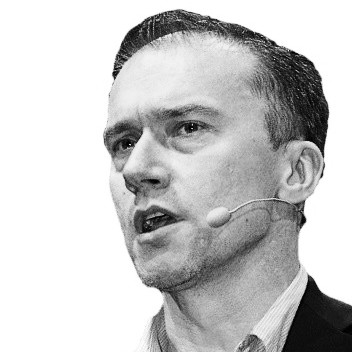Book Club: Mark Rhodes on How a Winning Mindset Empowers Sales Success
1.7K View | 25 Min Read
Olivia Fuller: Hi and welcome to Book Club, a Sales Enablement PRO podcast. I’m Olivia Fuller. Sales enablement is a constantly evolving space and we’re here to help professionals stay up to date on the latest trends and best practices so they can be more effective in their jobs.
At some point in your life, you’ve likely been told that you can achieve anything you want if you put your mind to it, but the real key here is knowing how to use your mind to achieve your goals. This is exactly what the book Think Your Way To Success: How to Develop a Winning Mindset and Achieve Amazing Results by Mark Rhodes digs into. As Mark explains in the book, you can achieve success by developing a winning mindset. I’m so excited to have Mark here with us today to tell us a little bit more about this concept and his book. So with that, Mark, I’d love it if you could just tell us a little bit about yourself, your background, and your book.
Mark Rhodes: Hi, thanks, Olivia. It’s quite interesting actually because when I was younger I was very shy and I got a job in an accounting firm and I was there for about seven years and realized, you know what, I wish I had gone into IT tech because I love the IT tech world. As an early adopter all those years ago on a home PC and I taught myself programming, but I worked in the accounting business world for about seven years. Then I moved over into tech, being a project manager, leveraging my business background, and all those sorts of things. I was doing some good project management projects at some really big companies, and then I spotted an opportunity to start my own internet software business and that took off really, really well. I had some really big brand clients and I was doing all of the selling for the business and after about sort of 2 or 3 years, a big Silicon Valley US company came along and said they wanted to buy the business. I said it wasn’t for sale until I got their fourth offer. Then I decided it was for sale.
Anyway, after the dust settled, I started thinking how did I do that? You know, how did quiet, shy Mark go and do that? I just seemed to be able to change in time to take the action that was needed to win these big sales deals and all of this. I became fascinated with success and what makes people successful and I started looking into how the mind works. I studied various things around mindset and things like that and that enabled me to almost reverse engineer myself and figure out how I achieved this success. I realized that most of it was down to mindset and that’s what led me to write Think Your Way to Success because it was after I’ve done all of that discovery, I thought, you know what, I could get this down in a way that it could help other people and not just help other people, I still use it every single day to help me go to the next level in anything I’m doing. So that’s really the story behind it.
OF: I love that journey and as you mentioned, the book really is all about the importance of mindset and helping people to be able to achieve their goals. I’d love to learn a little bit more. In your experience, what does it really mean to have a winning mindset?
MR: I think it means everything. I think all too often people discount positive thinking and mindset as some sort of soft skill or something like that, but I am always saying to people it’s actually an essential skill or part of our being because whenever you get into any situation in life or business if people are not achieving the results, they’re not achieving the results because they’re not taking the action or they’re not taking effective action and usually it’s down to mindset. It doesn’t matter how many situations I get pulled into with small businesses, large businesses, or global corporations, you find out at the end of the day, that most people know what they should be doing and the reason they’re hesitating or putting off is simply because of mindset.
I used to have a big fear of public speaking, it was my biggest fear and the only thing behind it was my mindset and how I was thinking about it. I could have read 101 books on the skill set of how to do public speaking and presenting, but I still wouldn’t have taken the action to do it because it was that mindset piece that was missing the belief, the confidence, the motivation, having a compelling goal and all of those sorts of things. So having a winning mindset through sports, through business, through everything makes all the difference.
OF: Yeah, absolutely. You mentioned something there around the fact that people tend to think about mindset as a soft skill, but as you talk about in the book, there really is a lot of science behind it and some of the concepts that you do discuss in the book are based on NLP. For our audience here who may not be familiar with what that is, I’d love it if you could maybe just walk us through that a little bit and tell us a little bit about what NLP is and what it actually looks like in practice.
MR: It’s quite interesting because when I do my talks or any other things I do, I never usually mention NLP because sometimes people have heard of it and they think it’s something like wizardry or magic to make people do things they don’t want to do and all of that, which is really not the case. NLP is really just the discovery by a couple of guys, Richard Bandler and John Grinder many years ago who basically looked into and formulated how our minds work. What is the link between language and how we act and the action we take or we don’t take, and I always say to people that really NLP is really summarizing this little formula that we have thoughts, and the thoughts we have determined how we feel? How we feel determines the action we take or we don’t take and the action we take or we don’t take determines the results we get.
For instance, if somebody is quite shy and they don’t want to go to a party, their thoughts are high and probably don’t want to go to this party, I’ll probably end up with nobody to talk to. I really don’t want to go. So thinking like that they feel really bad, so the action they take on Saturday night when they go to the party, they think they’re going into a dreadful experience, so they naturally keep their head down, avoid eye contact, stand in the corner because you would, if you thought you were going to a dreadful situation. It’s a confident person thinks differently and they think, hey, I’m going to have a great night, I’m going to meet some new people, but it will be a great laugh because they think like that they feel good when they go in the room on Saturday night they naturally keep their head up, make eye contact, smile, get talking to people and say what a great night. In the end, when they come around and say what a great night, what a great bunch of people, they’ve been to the same party as the shy person has. They just had a very different experience based purely on how they were thinking about it beforehand. This is why we say that, how we think about that, i.e. our mindset, that self-talk that goes through our head in particular about how we think about things has a massive impact on the results we get because just by thinking in a certain way we get different ideas, different actions, different results. It’s exactly the same in sales, how we’re thinking about every conversation, we’re going to have every call, every discussion with a potential client. That is all mindset driven.
OF: That is a fantastic example and really puts it all into perspective. I’m glad you brought up sales there because I’d love to dive into that a little bit more specifically here. What are some of the common challenges that sales reps often do encounter and how can having this mindset shift actually help them overcome those challenges?
MR: I think one of the most common things I come along, and this isn’t unique to sales, it’s across a large percentage of people in all walks of life and in all situations, is that human beings have this tendency to think more about what they don’t want to happen in a given situation, rather not what they do want to happen. Very often a salesperson, when you’re looking to help them improve their performance and you’re talking to them, what are their current thoughts about this meeting they’re going to go to or this call they’re going to have with a prospective client? What are their main thoughts about that? You know, what goes through their head about it and they’ll say stuff as we will probably be too expensive. They’re probably not going to change from their current supplier. So things like that. All the thoughts are going through their mind. They’re even saying those things themselves like I hope I don’t lose this deal. So they are constantly focusing their thoughts on failure rather than success.
With the way the mind works, if we focus on the failure rather than the flip side of it, which would be the success, then our mind actually just looks for more evidence to support what we’re thinking about just to give us comfort that we’re right. We really need to flip that around and be looking at the outcome we want. That was one of the things that I always naturally did with sales because I realized when I said earlier that I was looking at how I’ve done what I’ve done and the results I got, I realized that one of the things I was always really good at the sales and I realized that before I went to a sales meeting, that voice in my head was saying they’re going to love our products, they’re going to love our team. I know we can really help them. I reckon this client is going to go with us, I reckon we’re going to win this deal. That would be my motivational self-talk before I would go to it, but when you look at one of the things that I was really bad at doing, which is public speaking and presenting, I was so scared once I pretended I had a car accident to get out of doing a talk many many years ago, I’d be thinking differently before that. If somebody said Mark, will you do a presentation, will you do a talk all those years ago I wouldn’t be thinking about everything going right like in my sales example? I’ll be thinking about everything going wrong, I’ll forget my words, I look nervous, I’ll sound nervous. The audience might not like it. I might pass out because that thought-feeling action results in a sort of formula.
If you like the basic NLP formula, when I’m thinking all that thought pattern is doing is making me feel worse and worse and worse and I’m running away from taking the action. A big thing to answer that question, as I say is that salespeople are to make sure you’re focusing on the outcome you want to happen, not the outcome you don’t want to happen. So many people do it, I hope I don’t lose this sales deal, I reckon we’re going to be too expensive.
OF: Yeah, that is a fantastic point. You do talk about in the book the importance of coaching and really developing that positive thinking into outcomes. I’d love to hear a little bit more about that. What is actually the role of coaching and making this positive thinking actionable?
MR: The role in coaching really is to help people feel more comfortable about the actions they’re taking because the reason that people are either not doing things, they need to be doing, not having the conversations or they’re doing avoidance tactics like they’re emailing rather than calling is because they feel uncomfortable about the action that they need to take. So coaching is really about finding out what areas of the role that they’re doing or the situations they’re in with the things that they’ve got to say and do that they don’t feel too comfortable with. That’s where you need to find out why it is and then either look to change their mindset around that particular thing or you need to actually find a different way of them saying what they need to say, so they feel more comfortable with it. Sometimes you can change one or two words in what somebody’s going to say in a conversation and it makes them feel much better about it. So I can say that but a few words ago where you were doing it differently, I couldn’t say that you know, but you tweak one or two words and people are more comfortable. Coaching is all about helping somebody be really comfortable and confident about what they need to say and do in order to do their role effectively.
OF: Absolutely. What are some of your coaching best practices to actually build that confidence in reps?
MR: Firstly, it’s to make sure that they are focusing on the outcomes they want, and if there are some things that they’re thinking about that might go wrong, looking to go back and come up with ways to offset that and understand why that might not happen or how we can avoid it, or how we can make that better. The key thing is, especially in the world of sales, one of the things that I always have to look at coaching-wise is whether the person, because what it’s about what motivation strategy they’re using subconsciously to drive them to action. For anything we’re going to do in life, we need to be motivated to do it, i.e. we need a reason to take that action. There are two ways in which we as human beings motivate ourselves to do things. One is what we call the towards strategy or in the old days you call the carrot, which is we motivate ourselves to go and take this particular action because all the good things are going to happen if we take that action. Whereas in some instances people will use what we call the stick strategy or the away from the strategy is the reason they’re taking action because they want to avoid the bad consequences, they’ll have to suffer if they don’t take action.
For instance, you’ll often find that there’ll be some sales people where their performance is sort of consistently good and probably over a long period of time going up and up or something like that, and you get other salespeople where their performance is up, down, up, down, up, down, up, down there, just like all over the place, up and down continually. Once you look at that and think, well, are they spending a lot of time implementing every time they do a sales deal? If it’s not that they don’t have to implement, they take their foot off the pedal selling and you’re still left with that in a normal sales cycle. That is an example that someone is most probably using a motivation away from strategy and that what motivates them to get on the phone or get out there and see people start the sales cycle is actually thinking about all the bad things that will happen if I don’t actually get on and make some sales calls today, I might not hit my target and if I don’t hit my target, I might get in trouble. That’s an away from a strategy that they’re really forcing themselves to do this activity because if they don’t do it, something bad is going to happen when you get somebody else who’s doing the sales activity got a compelling goal, they want to exceed their target. They want to do better than they did last month. So they’re out there and both can work. The only thing is that away from strategy as soon as you get far enough away from the danger, your subconscious part of your mind thinks you are because now you’ve got a couple of sales conversations underway and you’re away from that danger zone, you’ve done a few conversions, then subconsciously you take your foot off the pedal when you drop back down again until the danger point comes because it’s the danger point of some disaster consequence happening that forces you to get back in. So that’s not ideal, but it’s also not ideal because the person who’s using away from strategy to motivate themselves from action is motivating themselves with negativity. They’re having negative thoughts. If I don’t do this, this might happen, then they’ll pick up the phone or go on teams or zoom in to have a conversation about somebody buying something from them, whereas we all know in sales the best way to sell it is to be enthusiastic.
It’s quite hard after you’ve told yourself a load of mental negativity to go and be enthusiastic, so a really big point, as I say, is in addition to making sure they’re focusing on the outcome they want, also making sure that they are motivating themselves with this. This is what we call the towards strategy of thinking that all the good things are going to happen if they make these calls if they have these conversations if they win these deals. That’s what I’m primarily looking for because those two things lead me to everything else that’s either helping them be successful or holding them back.
OF: I love that advice. As you mentioned, fear can be a powerful motivator, but it might not lead to that long-term and sustained success. So that’s a fantastic point. For our audience here, who really are a lot of sales enablement practitioners, I’d love to dig into a little bit about how they might be able to actually help support the sales teams in actually developing these mindsets. So what would your advice be for sales enablement practitioners and being able to help really create a healthy sales culture that does encourage this positive attitude in order to actually achieve long-term success?
MR: Yeah, I think one of the biggest things is to be mindfully aware that it is the mindset that is probably if there are people that are not quite performing, where they need to be, it probably is a mindset issue that is holding them back. As I said earlier on, a lot of people don’t value mindset as an important thing. You think about this, in any sales team, once somebody has been through all the training, and knows the products and services, every single person in that sales team has got access to the same tools, the same website, the same products, the same services, they’ve had the same internal training and yet you’ll get vast differences, you’ll get some people doing amazingly well and you’ll get other people struggling, but they’re selling the same thing and they’ve got the same corporate website and they’ve got all the same sales tools, they’ve got the same playbook, they’ve got everything the same. Why is there such a big difference in results? Mindset is the only thing that’s left as long as someone is out of the learning curve and getting into the groove and all that sort of thing once they’re up and running and they’ve done everything mindset is the thing that’s left so be mindful that mindset is probably the reason that people are not performing and then we need to look at that.
The biggest thing we can do is listen to the words they use because like earlier when I was talking about what strategies usually the towards or away from. You can find out that just by listening to the words they use somebody who’s using a toward strategy will talk about winning, achieving, and obtaining. There is somebody who’s using away from type strategy on themselves will talk about avoiding, not missing out on, losing. There will be very different words that they’ll be using. There’ll be avoiding disaster words rather than the flip side, which is the achieving words and also a big thing to look out for, you know if you’re in sales enablement and you’re looking to help people in mindset is the hesitation points. In their voice when they’re talking, there’ll be points where you’re listening to a call or something like that or you’re working with them, you’re doing a bit of role-play stuff like that where there are points that they’re uncertain. They will change their tonality slightly. They will hesitate a bit and things like that.
One of the biggest things we can do even with ourselves, not just as a sales enablement person, but any of us is to watch out for our hesitation points. When we say, oh, I’m going to give that person a call in a minute, oh no, I’ll do it tomorrow, they might be busy or I’m going to go and do this those are hesitation points and they are the reason why we’re stopping ourselves taking the action usually because it’s uncomfortable. That’s another thing I think that’s really important to look out for, but also to have this, I think when you say about a sales culture that encourages positive attitudes, it’s to have this sort of understanding that people usually doing the best they can with the skill set and the mindset they’ve currently got and for us sales enablement practitioners, it’s not just to help them develop their skill set, but more often their mindset so that they can be the best that they can be.
OF: That is fantastic advice, Mark. Thank you so much for sharing all of this with our audience. I know I learned a ton and I’m sure our audience did as well. So thank you again for taking the time.
MR: Thank you, it’s been great.
OF: Thanks, and to our audience we absolutely recommend picking up a copy of Mark’s book and will include a link to that in the transcript. Thanks for listening for more insights, tips, and expertise from sales enablement leaders visit salesenablement.pro and if there’s something you’d like to share or a topic that you’d like to learn more about, please let us know. We’d love to hear from you.














